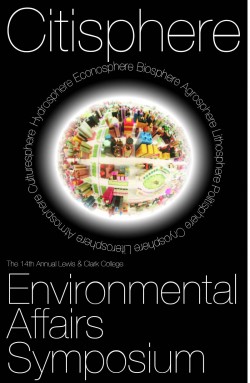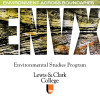2011 Symposium
“Citisphere”
14th Annual Symposium on Environmental Affairs
October 10-13, 2011

The city is becoming one of Earth’s most important environments, with a reach far greater than its physical footprint. And yet cities have commanded limited attention in traditional environmental discourse, with much of the focus on carbon emissions reduction through “green building” and transportation planning. This year’s Environmental Affairs Symposium, Citisphere, seeks to expand this discourse and to explore the diverse characters, mechanisms, and roles of cities in biophysical and social systems at all scales.
Physicists, sociologists, urban planners, architects, ecologists, artists, and historians will speak to the ways cities grow and develop, and to the ways cities and people shape each other. Is there such a thing as too much planning? Do cities ever die? Which features of cities can be generalized? Who and what makes a city flourish? Can cities generate “environmental capital”? The 14th Annual Environmental Affairs Symposium seeks to understand how the complex system of world cities – which we dub the Citisphere – works among other spheres of human and environmental significance.
Fish-eye image courtesy of Pablo Aguilar
Schedule
Monday, October 10
- 3:00-5:00
- Building a City Workshop led by James Rojas
-
Stamm Hall
Tuesday, October 11
- 3:00-4:30
- Panel: The Design Continuum
- Stamm Hall
- 5:00-6:30
- Panel: Landscape Transformations
- Stamm Hall
- 8:00-9:00
- Keynote Address by Janice Perlman (The Mega-Cities Project)
The Urban Century: Cities, Mega-Cities, and Urban Innovation
Reception to follow
-
Agnes Flanagan Chapel
Wednesday, October 12
- 3:00-4:30
- Panel: Fluxes: The Ins and Outs of Cities
- Stamm Hall
- 5:00-6:30
- Panel: Cities as Agents of Change
- Stamm Hall
- 8:00-9:00
- Keynote Address by LuÃs Bettencourt (Los Alamos National Laboratory)
The Great Urban Transition: New Opportunities and Challenges for Humanity’s Relationship with the Environment
Reception to follow
- Council Chamber
Thursday, October 13
-
3:00-4:30
- Panel: Birth, Life, and Death of Cities
- Stamm Hall
- 5:30-7:30
- Closing banquet: Environmentalism of Cities
- Stamm Hall
“Citisphere” Keynote Speakers
Dr. Janice Perlman is the Founder and President of the Mega-Cities Project, a nonprofit organization geared toward sharing innovative solutions to problems common to cities with over 10 million people. The Mega-Cities Project’s goal is “to shorten the time lag between ideas and implementation through experiential learning, collective creation of new knowledge, and preparing the next generation of urban leaders.” The organization’s personal network-based approach to disseminating and scaling up local solutions has been adopted by UN-Habitat as an Urban Best Practice. Dr. Perlman earned a BA from Cornell University in Anthropology and Latin American Studies and a PhD from MIT in Political Science. She was a professor of City and Regional Planning at University of California, Berkeley before founding the Mega-Cities Project. She also coordinated an Inter-Agency Task Force on National Urban Policy under President Carter; served as Executive Director of Strategic Planning for the New York City Partnership; and acted as Senior Advisor to the World Bank’s Urban Projects Department. She is the author of The Myth of Marginality: Urban Poverty and Politics in Rio de Janeiro (University of California Press), winner of the C. Wright Mills Award. Dr. Perlman received Guggenheim and Fulbright Fellowships to complete her latest book, Favela: Four Decades of Living on the Edge in Rio de Janeiro (Oxford University Press).
Dr. LuÃs Bettencourt is a Research Scientist at Los Alamos National Laboratory and a Research Professor at the Santa Fe Institute. His research interests center on the structure and dynamics of diverse complex phenomena, ranging from the emergence and spread of diseases to the social dynamics of innovation and discovery. His work on cities investigates how rates of innovation, wealth creation, crime, or disease incidence scale with city size, identifying common “laws” in such relationships and suggesting implications for the growth and sustainability of human communities. Dr. Bettencourt holds a Licenciatura in Engineering Physics from the Instituto Superior TecnÃco in Lisbon, Portugal and a PhD in Theoretical Physics from Imperial College, University of London. He has held postdoctoral positions at Heidelberg University, MIT, and Los Alamos National Laboratory. His work on “Growth, innovation, scaling, and the pace of life in cities” has been highlighted by Scientific American, New Scientist, Harvard Business Review, and the premier scientific journal Nature. Dr. Bettencourt also consults for the U. S. Department of Energy’s Office of Science and Technology Information about scientific innovation and discovery.
“Citisphere” Workshop Leader
Mr. James Rojas is an urban planner and the co-founder of the Latino Urban Forum (LUF). LUF focuses on promoting safer, more vibrant Latino communities by enhancing public spaces, drawing on Mr. Rojas’ research on unequal access to urban amenities including parks, sidewalks, and safe crossings. He also studies Latino cultural influence on urban design. He has worked as a transportation planner at the Los Angeles County Metropolitan Transportation Authority and holds a Master of City Planning and Master of Science Architecture Studies from MIT. Mr. Rojas leads workshops that draw out citizens’ own solutions to urban planning problems and that highlight the diverse planning priorities of various groups. These playful workshops involve construction of cities out of found objects – blocks, buttons, bottlecaps – transforming “junk” into organized and beautiful structures. A photograph of one of these cities is the signature image of the 14th Annual Environmental Affairs Symposium, and Mr. Rojas will lead a workshop to kick off the Symposium.
“Citisphere” Panels
Tuesday, October 11
The Design Continuum
3:00-4:30 PM Stamm Hall
Cities possess a spatial element. Buildings are set at varying distances, blocks are left empty by intention, and constructions spread in every direction, even up and down. How much of the built environment is planned, and how much of it arises organically from the countless interactions of thousands of agents? Are mega-cities on a sort of high speed evolutionary process? What are the implications of holding to design versus just letting things happen? From highly designed cities to places where zoning laws have never even been a consideration, this panel will examine how human intentionality, or lack thereof, shapes a space, and how that space in turn shapes the communities that dwell there.
Participating panelists:
- Janice Perlman (The Mega-Cities Project)
- Wayne Riley (Tivoli Industry Solutions)
- James Rojas (Latino Urban Forum
- Joseph Readdy (Portland State University)
Landscape Transformations
5:00-6:30 PM Stamm Hall
One need only look out the window of any urban high rise to see the changes a city brings to the landscape surrounding it. At night, lights dot the hills, drowning out the stars. Forests are cleared, sometimes to be replaced by parks. Water flows differently, flood patterns change, even the sounds you hear are different. While these changes have been lamented by many, they are exciting and promising for others. How does a city transform its surroundings? Which of these changes are unique to certain cities, and which do they have in common? Ultimately, what do these changes mean for communities inside and outside of cities?
Participating panelists:
- Matt Burlin (City of Portland)
- Chris Jones (Boora Architects)
- Ken Yocom (University of Washington)
- Nate Stoll (Lewis & Clark College)
Wednesday, October 12
Fluxes: Ins and Outs of Cities
3:00-4:30 PM Stamm Hall
Cities are centers of trade and production, innovation and growth. They are masses of resources, both physical and abstract, with material flowing in and out. These include people, food, manufactured goods, waste, energy and the myriad material things that move between the permeable boundaries of our cities. The fluxes discussed on this panel will involve complicated flows of people and goods, ranging from the movement of food, waste streams, and recent immigrants. This panel will focus on the flow of things into and out of cities and the ramifications of these exchanges.
Panel Participants:
- LuÃs Bettencourt (Los Alamos National Laboratory and Santa Fe Institute)
- Will Elder (Metro)
- Franklin Jones (B-Line Sustainable Urban Delivery)
- Timothy Mechlinski (Lewis & Clark College)
Cities as Agents of Change
5:00-6:30 PM Stamm Hall
As hubs of human activity, cities can alter themselves and the world around them at tremendous rates. Some cities are so influential that their urban policy shapes world policy. The Arab Spring showed the world how public urban squares could be central to dramatic shifts in international relations. Social activists take advantage of the spaces cities offer to change their environments, as well as those beyond the city limits and around the world. This panel will explore diverse ways that cities catalyze change.
Participating panelists:
- LuÃs Bettencourt (Los Alamos National Laboratory and Santa Fe Institute)
- David Galaty (Lewis & Clark College)
- Ken Leinbach (Urban Ecology Center)
- Bruce Podobnik (Lewis & Clark College)
Thursday, October 13
Birth, Life, and Death of Cities
3:00-4:30 PM Stamm Hall
Cities have life histories. They are born, they grow and expand, and they may even become “world cities” of global ubiquity. But cities also can reach a critical peak, lose potency, and falter. From natural disasters to economic busts, history reveals the range of factors that can kill or shrink a city. What sparks the birth of a city? What gives a city vitality? Do cities ever truly “die,” and what does that look like? This panel will explore these questions with perspectives both modern and historical.
Participating panelists:
- Terry Schwarz (Kent State University)
- Carl Abbott (Portland State University)
- Arthur O’Sullivan (Lewis & Clark College)
Environmental Studies is located in room 104 of Albany Quadrangle on the Undergraduate Campus.
MSC: 62
email envs@lclark.edu
voice 503-768-7790
Symposium Advisor Jim Proctor
Environmental Studies
Lewis & Clark
615 S. Palatine Hill Road
Portland OR 97219

